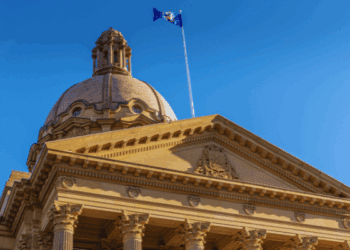OTTAWA, ON, Mar. 10, 2011/ – Troy Media/ – What should Canada do when provinces behave badly, damage Canada, and then send the bill to Ottawa? That’s the question the Commons Standing Committee on International Trade should be trying to answer right now. Unfortunately it is not the one they’ve been asked.
The bad behaviour in question was on the part of the government of Newfoundland and Labrador. Back in December 2008, then-Premier Danny Williams announced his plans to nationalize the provincial pulp and paper operations of AbitibiBowater. This was clearly intended as punishment for a company that had announced that it needed to cease operations after decades of investment and involvement in the provincial economy.
Expropriation without compensation
After a single day of debate in the House of Assembly, the premier pushed through his plan, extinguished the right of AbitibiBowater to seek redress before the courts, and made it clear that there would be no compensation for this seizure of assets.
Writing at the time, the late Bill Dymond, one of Canada’s leading trade experts, observed that, “serious harm has already been done to the province’s and Canada’s reputation as a secure location for foreign investment.” AbitibiBowater sought compensation under the investor protection provisions (“Chapter 11”) of the North American Free Trade Agreement (NAFTA). And they were duly awarded $130 million.
The catch, though, was that the government of Newfoundland and Labrador will not get the bill for its irresponsible behaviour. Provinces are not signatories of NAFTA. Only Ottawa can enter into treaties on behalf of Canada. But that also means that all the obligations under those treaties, including under NAFTA, fall solely on Ottawa’s shoulders, backed by federal taxpayers, who now face this $130 million bill, plus other costs.
There is currently no mechanism to make Newfoundland and Labrador, or indeed any province behaving badly in defiance of Canada’s international obligations, face the consequences of its actions. You’d never guess that a large majority of provinces were supportive of the original FTA and later NAFTA and, indeed, have loudly sought the extension of NAFTA’s benefits to state/provincial and local government procurement in the face of Buy America provisions instituted in the recent recession.
But has the Commons Standing Committee on International Trade been asked to report on how provinces might be brought to book, and federal taxpayers relieved of a burden that they had no role in creating?
Au contraire. They’ve been asked to report on the impact of the AbitibiBowater settlement on “future democratic decisions taken in the public interest by Canadian governments at all levels.”
Don’t blame the Committee. They were given their mandate by the House of Commons, a body apparently in the grips of the confused notion that democracy means the right of governments to seize any property they fancy because they think it is in the public interest to do so, and to do so without compensation.
But the investor protection provisions of NAFTA create no bar to Canadian governments acting in the public interest through law and regulation. They do, however, properly require that the government pay the legitimate costs associated with its decisions, including compensating parties whose property is confiscated or nationalized.
Governments in Canada have the right to take your house, farm, or factory, but the requirements of fairness and the Canadian democratic tradition normally subject that power to limits. Governments must compensate you if they take your property. Moreover they don’t get to set the price unilaterally; it must be done by an arm’s length agency and be subject to judicial review.
It was Newfoundland and Labrador’s decision to ignore these rules of decent behaviour that created the damage that federal taxpayers must now clean up.
If there is any kind of a democratic deficit in the AbitibiBowater decision, surely it is here: in a genuine democracy, voters should have to face the true costs of their decisions so that they can make a balanced assessment of the pros and cons. The current arrangements force innocent federal taxpayers, who have no hand in choosing provincial governments in other provinces, to nonetheless pay the tab for those governments’ bad behaviour. And that is practically the textbook definition of a perverse incentive.
Ottawa needs legal power to claw back costs
Canadians should, therefore, be looking to the Standing Committee to recommend that some kind of formal mechanism be established, by legislation if necessary, to ensure that the potential for such destructive gaming of the system be eliminated. Ideally this should be done by negotiation with the provinces, but the principle at stake is serious enough that Ottawa should consider giving itself the legal power to claw back these costs from federal transfers to provinces. Otherwise we confer on the provinces power without responsibility – a combination that actually does damage democracy in Canada.
Read Brian’s Commentary entitled “AbitibiBowater, Democracy and the Public Interest”
Brian Lee Crowley is the Managing Director of the Macdonald-Laurier Institute, an independent non-partisan public policy think tank in Ottawa: www.macdonaldlaurier.ca.




